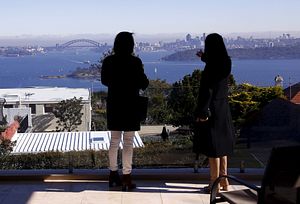Australia is in the midst of a housing affordability crisis. A poll in May revealed most Australians who do not own homes worry they will never be able to buy one, with house prices galloping by about 15 percent in Melbourne and almost 20 percent in Sydney in the last year. In January a study of property markets around the world declared Sydney’s one of the most expensive – second only to Hong Kong. Melbourne was not far behind.
The price spiral has coincided with ballooning Chinese investment in Australian real estate markets. Between 2009 and 2015, Chinese real estate purchases increased by 900 percent, as national property values soared. In 2016 China was the largest source of foreign investment in Australia, to the tune of AU$47.3 billion (US$35 billion), of which AU$31.9 billion was channeled into local real estate.
In the last few years, wealthy Chinese citizens have been drawn to property markets in the West, particularly in Canada and Australia. Overseas investment has been driven by a number of factors: concern at being priced out of China’s booming housing sector, restrictions on domestic property ownership, and the prospect of the yuan depreciating significantly as the economy slows.
The Australian authorities see foreign investment in residential real estate as a means of increasing the country’s housing supply, which has not been keeping pace with demand. But some local media have taken a negative view of the influx of capital, blaming Chinese investors for exacerbating property inflation. In January a survey of Sydney residents showed a majority were opposed to foreigners buying homes and regarded them as the main cause of the price spiral.
The findings, published in the Journal of the Australian Geographer, appear to reflect heightened concerns over Chinese investment and the affordability of housing: the average resident of Sydney, the country’s largest city, spends AU$1.1 million ($820,000) on a home – 13 times the national median income. But a Treasury working paper last year stated that “foreign demand has accounted for only a small proportion of the increase in property prices in recent years.”
Local demand, fueled by low interest rates and a lack of new housing, is believed to be mainly responsible for the rise. While the government research indicated that 70 percent of foreign investment approval applications for housing were from Chinese citizens, a study by the National Bank of Australia showed that Australian residents and investors purchase by far the biggest proportion of domestic real estate.
Australia limits foreign investors to buying new dwellings. But in May, seemingly in response to public concern over Chinese investment, the government restricted overseas purchasers to 50 percent of apartments in new developments and imposed a levy of AU$5,000 on homes that are left unoccupied for at least six months of the year. In Canada, British Columbia’s imposition of a 15 percent tax on foreign buyers led to a substantial drop in overseas investment in the Vancouver housing market. However, there are suggestions that many Chinese investors are circumventing Australian laws by exploiting regulatory shortcomings.
In January, it was reported that Australia’s financial intelligence agency, the Australian Transaction Reports and Analysis Center, investigated about US$740 million worth of property-related suspicious financial transfers by Chinese investors that had been reported in 2015-16. The Australian, which broke the story, said the transfers – indications that wrongdoing may have occurred – had raised concerns over Chinese rorting, or sidestepping, of foreign ownership laws, which it said was rife.
The title said scams included enlistment of networks of families and friends to transfer multiples of US$50,000 – the maximum amount of foreign currency China permits a citizen to transfer out of the country per year – to Australia, where a trusted agent buys a property and the purchasing of homes via webs of incorporated companies or through permanent Chinese residents. In March, Transparency International (TI) highlighted the real estate market’s vulnerability to such evasion when it warned about the threat posed by money launderers. It said there is clear evidence that overseas investment in Australian property is an “easy and convenient way to hide hundreds of millions of dollars” from law enforcement agencies.
The anti-corruption campaign group pointed out that 70 percent of Chinese buyers pay in cash, representing the largest proportion of foreign purchases in the country, yet estate agents, lawyers, and accountants are not subject to anti-money laundering legislation.
According to TI, this means that professionals engaged in the sale of properties are not obliged to conduct due diligence on parties involved in a purchase or to report suspicious transactions even when they believe that illegal activity is taking place. Moreover, TI said, there is no requirement to disclose the identity of individuals (or beneficial owners) behind foreign companies purchasing property. In 2015 similar anxieties were expressed by the Paris-based Financial Action Task Force, an international advisory group set up to combat financial crime. It said “large amounts” of cash from China are suspected of being laundered through Australia’s real estate market. TI said that in recent years there have also been reports of such activity by investors from PNG, Malaysia, Russia, and South Sudan.
There are indications that measures introduced by Beijing last year to reduce the outflow of capital and credit availability may significantly curb Chinese interest in Australian property this year, taking some of the heat out of the market. But serious concerns over overseas investment in real estate will continue to be raised until the Canberra government closes regulatory loopholes to guard against foreign ownership breaches and financial crime.
Yigal Chazan is an Associate at Alaco, a London-based business intelligence consultancy.

































